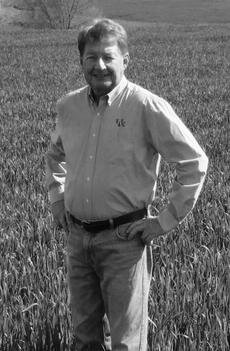Kentucky Small Grain Production is Transitioning to Meet Industry Needs
Pat Clements, Chairman
Kentucky Small Grain Promotion Council
More than 30 years ago, a group of small grain producers, university personnel and industry representatives conducted their first meeting to develop an organization which would work to help small grain producers in Kentucky. Their objectives were simple:
Identify and develop specialized market opportunities for small grain producers
Support research that is directed towards increasing the profitability of small grain production
Provide continuing education opportunities such as seminars led by wheat specialists, workshops on personnel management and machinery maintenance, economic pesticide application and training, etc.
Provide representation for Kentucky’s small grain producers
I thought it would be a nice time to update you on how your grower and checkoff boards are continuing to work toward these goals.
On identifying and developing specialty markets, we continue to appreciate the opportunities that Siemer Milling has brought for Kentucky farmers. Much of the wheat that is grown in Kentucky ends up at a Siemer mill to be processed for several popular items on store shelves and restaurant menus. Siemer has also invested in production research, by supporting the University of Kentucky Grain and Forge Center of Excellence.
A recent initiative that shows great promise is redeveloping the rye markets in Kentucky. Small grain growers are benefiting from the surge in local distilleries looking for locally-grown grains. Partnerships have formed to grow the markets, and the goal is to have 10,000 acres of rye in production by 2030. We have also been investing in research for barley, another popular distiller’s grain.
Research has always been an investment priority for Kentucky Small Grains Growers. To date, more than $3.8 million have been directed to small grain research and education programs to grow small grain grower profitability. No-till and intensive wheat management have been cornerstone programs in achieving that mission. Other noteworthy projects include Kentucky small grain variety development, precision agriculture, using ryegrass to reduce the fragipan layer, reducing head scab, and many more. We will be soliciting new projects to consider in the coming months. If you have ideas, feel free to contact me or our staff.
The advances of Kentucky’s wheat industry would not have been possible without the University of Kentucky’s contributions, and collaborations with farmers, extension experts, and private consultants. Kentucky wheat production has grown 87 percent since the Kentucky Small Grain Promotion Council was formed, and three of the past five years have resulted in record average wheat yields: 80 bushels per acre in 2016, 77 bushels per acre in 2017, and 76 bushels per acre in 2019.
According to the National Agriculture Statistics Service, Kentucky farmers seeded 530,000 acres this past fall, up 20,000 acres from previous year. Wheat condition remains mostly good despite being subjected to two significant freezes. It will be interesting to hear what UK’s wheat and small grain experts tell us at the May 11 wheat meeting. A good crop and the better prices we have received the past couple years are great news for our industry.
Additionally, I wanted to call attention to new grower leadership at Kentucky Small Grains. Our board has grown to better represent Kentucky’s changing production areas. Brandon Hunt of Christian County was recently appointed to serve on the Kentucky Small Grain Promotion Council. New grower association board members include Neil Denton (Ballard County), Thomas Folz (Christian County), Jason Head (Todd County), Matt Moss (Fulton County), Randal Rock (Anderson County), Joe Thompson (Daviess County), Curtis Weatherford (Hickman County), and Greg Ginder, representing Siemer Milling.
I am excited to see how these young grower leaders will impact the future of our industry. It also reminds me of the legacy Don Halcomb left for us to follow. To honor his memory, we have administered the Don Halcomb Memorial Scholarships for Community Leadership Through Agriculture for the past two years for Walnut Grove Farms and his family. Two recipients were just named who will each receive $1,000.
Lily Martin, a student in Webster County, was chosen as the High School application winner. The committee appreciated her willingness to get experience away from home, including her desire to study abroad. They were also impressed with her career choice and her founding of the Doll project in her local community.
Landon Haile, a pre-veterinary student at Murray State, was selected as the college application winner. The committee appreciated his willingness to get experience away from home, but particularly his desire to return to his home community to start a business after vet school.
I cannot wait to see what these young people accomplish for agriculture.
To learn more about Kentucky’s small grain industry, funded research, education opportunities for growers, and exciting market initiatives, please check out other pages in this web site.

